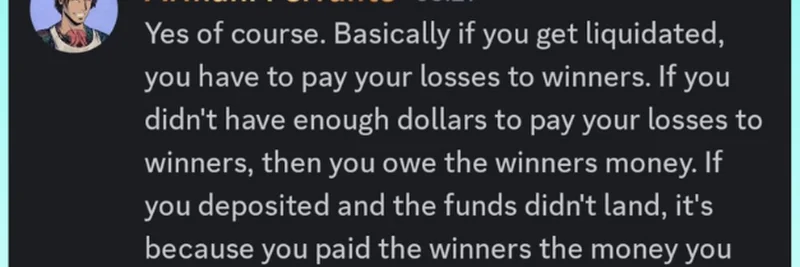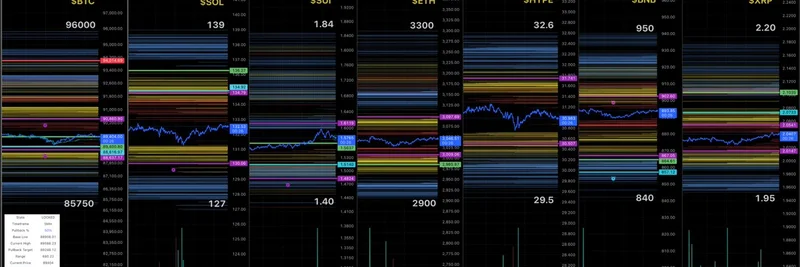In the fast-paced world of crypto trading, especially with meme tokens that can swing wildly in value, understanding the nuts and bolts of perpetual futures—often called "perps"—is crucial. These are derivative contracts that let you bet on the price of an asset without an expiration date, using leverage to amplify gains (or losses). But as Solana co-founder Anatoly Yakovenko recently pointed out in a thread on X, even the best-designed perp exchanges can't fully shield users from going into the red during massive market dips.
The Backstory: A Viral Liquidation Controversy
It all started with a post from trader @CryptoA77468, who highlighted a frustrating scenario on Backpack Exchange, a Solana-based platform known for its user-friendly wallet and trading features. Imagine getting wiped out in a liquidation—a forced sale of your position when the market moves against you—and then depositing more funds, only to see them vanish because your account was still in debt. The post accused Backpack of being worse than traditional banks, sparking a firestorm.
Backpack's founder, Armani Ferrante, jumped in with a detailed response, emphasizing that the exchange had already settled all positions without clawbacks or socialized losses (where losses are spread across users). He explained that perps are a zero-sum game: winners get paid directly from losers' collateral. If losers go bankrupt, there's simply no money left to pay out, leading to temporary imbalances.
But critic @tayvano_ wasn't buying it, arguing that the real problem was designing a system prone to such issues in the first place.
Yakovenko's Take: No Guarantees in Perp Trading
That's where Yakovenko, often called "Toly," chimed in. He stressed that no perp exchange can guarantee positions won't go negative. "That's why there is an insurance fund and automatic deleveraging," he wrote, "and why every CEX [centralized exchange] will sometimes haircut the users' gains."
In simple terms, an insurance fund is a pool of money set aside to cover shortfalls during extreme volatility, like the recent market cascade that liquidated billions across crypto. Automatic deleveraging (ADL) kicks in when the fund runs dry, forcibly closing profitable positions to balance the books—essentially "haircutting" winners to pay losers' debts.
Yakovenko noted that perps operate in a shared pool of funds from longs (betting on price increases) and shorts (betting on decreases). They can't always balance perfectly 1:1 in real-time; the goal is equilibrium over time. This setup is inherent to all margin trading systems, not just crypto.
To illustrate, he shared a screenshot from a ChatGPT explanation of traditional margin accounts on platforms like E*Trade, showing how borrowed funds can lead to negative equity if assets plummet faster than the broker can liquidate.
Why This Matters for Meme Token Enthusiasts
Meme tokens, with their hype-driven pumps and dumps, are prime territory for perp trading on chains like Solana, where low fees and high speed make leveraged bets appealing. Platforms like Backpack integrate seamlessly with Solana's ecosystem, including NFT projects like Mad Lads, which often tie into meme culture.
But Yakovenko's insights serve as a stark reminder: leverage amplifies risks. During a liquidation cascade—like the one triggered by a broader market crash—imbalances can lead to unexpected outcomes, even on decentralized or hybrid exchanges. For traders chasing the next big meme coin moonshot, this means always factoring in the potential for insurance fund depletion or ADL.
Backpack, for its part, prides itself on transparency, publishing daily proof of reserves and isolating risks so spot holders (non-leveraged) remain unaffected. Ferrante encouraged affected users to reach out via email or Discord, reinforcing their commitment to doing right by the community.
Key Takeaways for Safer Trading
- Understand Zero-Sum Mechanics: In perps, your gains come from someone else's losses. Bankruptcy on one side can delay or reduce payouts.
- Leverage Wisely: High leverage might promise big wins, but it also hastens liquidations in volatile meme markets.
- Check Exchange Policies: Look for robust insurance funds and clear ADL rules. Backpack's neutral, peer-to-peer model aims to minimize systemic risks.
- Stay Informed: Follow voices like Yakovenko for technical breakdowns that cut through the noise.
As crypto evolves, discussions like this highlight the need for better user education and system designs. Whether you're trading memes or blue-chips, remember: in perps, the house doesn't always win—but the market's whims can catch anyone off guard. For more on Solana's meme ecosystem and trading tips, stick with Meme Insider.


